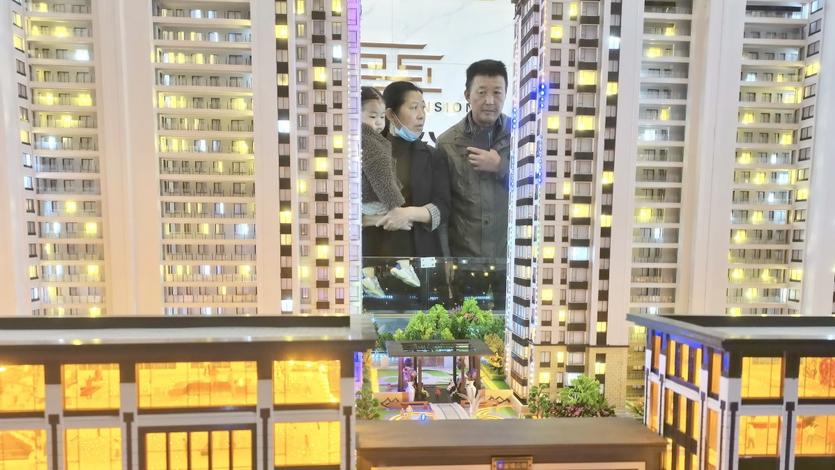 This undated file photo shows potential homebuyers looking at a property model in Huaian, Jiangsu province. (CHEN LIANG / FOR CHINA DAILY)
This undated file photo shows potential homebuyers looking at a property model in Huaian, Jiangsu province. (CHEN LIANG / FOR CHINA DAILY)
Various ministries and departments of the Chinese government are coordinating efforts to improve regulation of the real estate industry, following the issuance of a new guideline to further eliminate disorder from the market, experts said.
On Friday, a guideline issued by eight government departments, including the Ministry of Housing and Urban-Rural Development, was widely circulated across China.
The guideline emphasized that order in the real estate market needs to be improved significantly in the next three years.
"The document showed the Chinese government's resolution to take the market regulation to a deeper and a more precise level," said Liu Hongyu, a professor with Tsinghua University.
"Despite the important status of real estate in China, we have reiterated not to treat the industry as an economic stimulus tool. We stuck firmly to the principle of 'housing is for living in, not for speculation' even when the economy was hit hard during the COVID-19 pandemic last year," Liu said.
Despite the important status of real estate in China, we have reiterated not to treat the industry as an economic stimulus tool. We stuck firmly to the principle of 'housing is for living in, not for speculation' even when the economy was hit hard during the COVID-19 pandemic last year.
Liu Hongyu, professor with Tsinghua University
In 2018, the Central Committee of the Communist Party of China and the State Council, China's Cabinet, established a long-term mechanism to regulate the property market.
ALSO READ: China to cap bank loans to real estate to curb systematic risk
Since then, local governments and the authorities concerned have made progress in stabilizing land and home prices, kept market expectations at a rational level, and promoted the stable and healthy development of the market, said the Ministry of Housing and Urban-Rural Development.
The year-on-year increase in 2020 prices of new and pre-owned homes in commercial buildings in 22 pilot cities was narrowed by 3.1 percentage points and 1 percentage point, respectively.
Owing to varied factors, some property markets in Chinese cities started to trend up, with several of them showing signs of overheating. This led to calls for responsive, accurate and forceful measures to regulate and supervise the market.
Friday's guideline followed Vice-Premier Han Zheng's call on Thursday for efforts to accelerate the development of government-subsidized rental housing and resolutely implement the long-term housing mechanism. Han was addressing a teleconference on developing rental housing and facilitating regulation of the real estate market.
He underlined development of government-subsidized rental housing, calling it a key task in housing construction during the 14th Five-Year Plan period (2021-25). He also stressed that housing issues in large cities should be addressed promptly.
"The added significance given to government-subsidized rental housing is meant to end the current situation where newcomers in a city can't afford to buy an apartment or find a place good enough for renting," said Yu Xiaofen, vice-president of the Zhejiang University of Technology, who is also the dean of the Chinese Academy of Housing and Real Estate at the university.
READ MORE: Shanghai, Hangzhou lead in fresh wave of realty tightening
Yu said she expects government policies and market mechanisms to increase the supply of low-rent small-sized apartments substantially for new urban residents and young people.
For years, there have been no specific policies to support rental housing, she said. More than 40 percent of first-tier cities' populations are living in rented apartments. The huge demand comes from non-local residents as well as the large number of fresh graduates.


